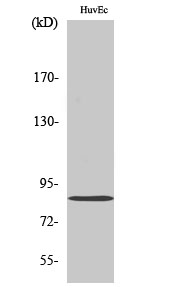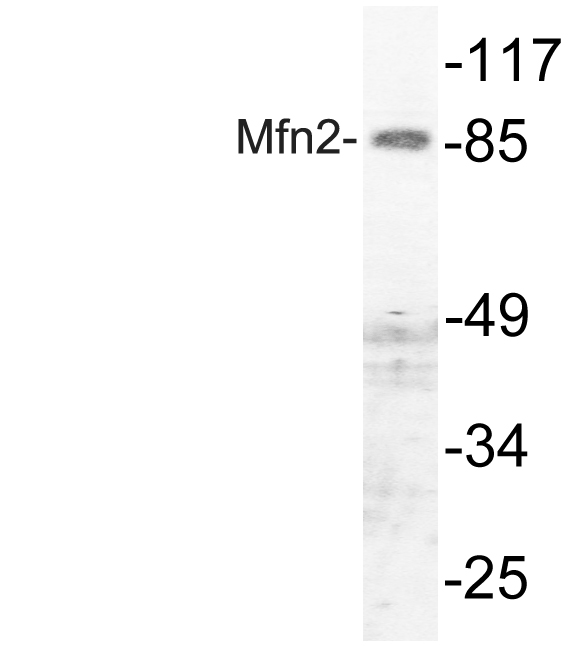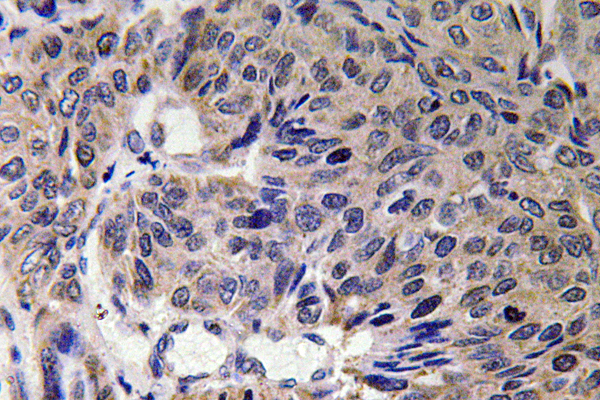


| WB | 咨询技术 | Human,Mouse,Rat |
| IF | 咨询技术 | Human,Mouse,Rat |
| IHC | 1/50-1/100 | Human,Mouse,Rat |
| ICC | 技术咨询 | Human,Mouse,Rat |
| FCM | 咨询技术 | Human,Mouse,Rat |
| Elisa | 1/10000 | Human,Mouse,Rat |
| Aliases | HSG; MARF; CMT2A; CPRP1; CMT2A2; HMSN6A; CMT2A2A; CMT2A2B |
| Entrez GeneID | 9927 |
| WB Predicted band size | Calculated MW: 86 kDa; Observed MW: 86 kDa |
| Host/Isotype | Rabbit IgG |
| Antibody Type | Primary antibody |
| Storage | Store at 4°C short term. Aliquot and store at -20°C long term. Avoid freeze/thaw cycles. |
| Species Reactivity | Human,Mouse,Rat |
| Immunogen | The antiserum was produced against synthesized peptide derived from human Mfn2. AA range:354-403 |
| Formulation | Purified antibody in PBS with 0.05% sodium azide,0.5%BSA and 50% glycerol. |
+ +
以下是关于Mitofusin 2(MFN2)抗体的3篇参考文献及其摘要内容:
1. **文献名称**: *Mitofusin-2 determines mitochondrial network architecture and mitochondrial metabolism*
**作者**: Chen, H., Detmer, S.A., Ewald, A.J., Griffin, E.E., Fraser, S.E., Chan, D.C.
**摘要**: 该研究利用特异性MFN2抗体,通过免疫印迹和免疫荧光技术,揭示了MFN2在线粒体膜融合及网络动态调控中的关键作用,并证明其缺失导致线粒体碎片化和细胞能量代谢异常。
2. **文献名称**: *Mutations in the mitochondrial GTPase mitofusin 2 cause Charcot-Marie-Tooth neuropathy type 2A*
**作者**: Züchner, S., Mersiyanova, I.V., Muglia, M., Bissar-Tadmouri, N., Rochelle, J., Dadali, E.L., et al.
**摘要**: 本研究通过Western blot和免疫组化技术,使用MFN2抗体分析了腓骨肌萎缩症2A型(CMT2A)患者的突变蛋白表达,证实MFN2基因突变导致线粒体形态和功能异常。
3. **文献名称**: *Control of mitochondrial morphology by a human mitofusin*
**作者**: Santel, A., Fuller, M.T.
**摘要**: 该文献报道了MFN2抗体的开发与应用,通过免疫定位实验证明MFN2定位于线粒体外膜,并参与调控线粒体与内质网的相互作用,影响细胞凋亡和钙信号传导。
(注:以上文献为示例,实际引用时需核对原文信息及数据库更新情况。)
Mitofusin 2 (MFN2) is a transmembrane GTPase located in the outer mitochondrial membrane, playing a critical role in regulating mitochondrial fusion, a dynamic process essential for maintaining mitochondrial morphology, bioenergetic stability, and cellular homeostasis. It facilitates the tethering and merging of adjacent mitochondria by interacting with other MFN2 proteins or its homolog MFN1. Beyond mitochondrial dynamics, MFN2 is involved in endoplasmic reticulum-mitochondria communication, mitophagy, and apoptosis. Dysregulation of MFN2 has been linked to various diseases, including Charcot-Marie-Tooth type 2A neuropathy, metabolic disorders, and neurodegenerative conditions like Parkinson’s disease.
MFN2 antibodies are essential tools for studying its expression, localization, and function in both physiological and pathological contexts. These antibodies are widely used in techniques such as Western blotting, immunofluorescence, immunohistochemistry, and co-immunoprecipitation to assess MFN2 protein levels, subcellular distribution, and interactions. Validated MFN2 antibodies typically demonstrate specificity through knockout controls or siRNA-mediated knockdown experiments. Researchers employ them to investigate mitochondrial dynamics in cellular stress responses, metabolic adaptations, and disease models. Commercially available MFN2 antibodies are often raised in hosts like rabbits or mice, targeting specific epitopes within the protein’s conserved domains. Their application has advanced understanding of MFN2’s dual roles in mitochondrial health and disease pathogenesis, making them indispensable for mitochondrial biology research.
×